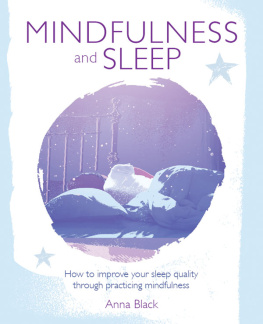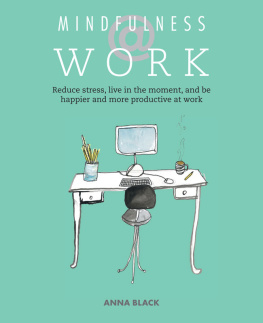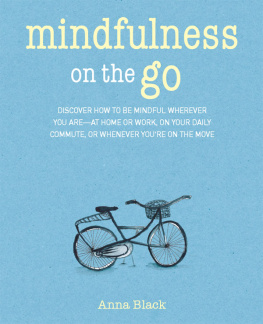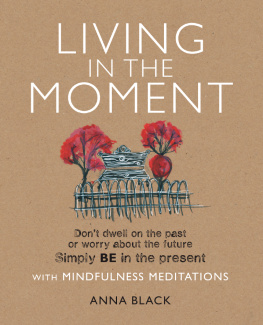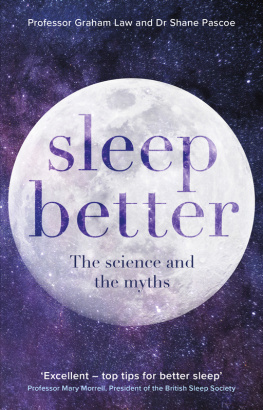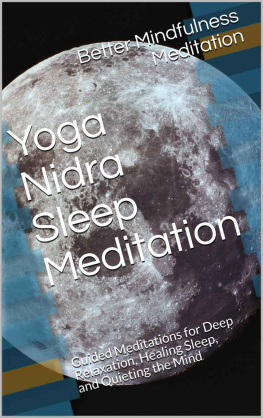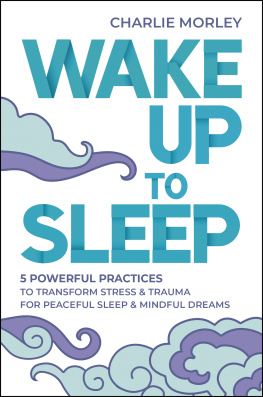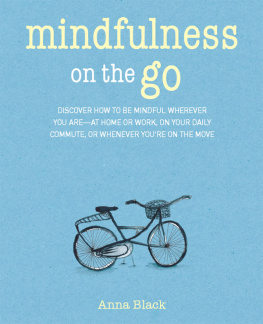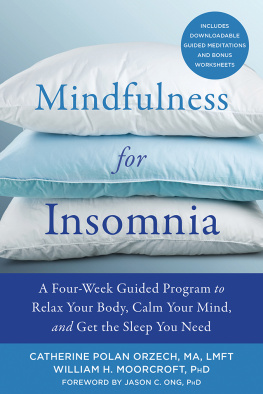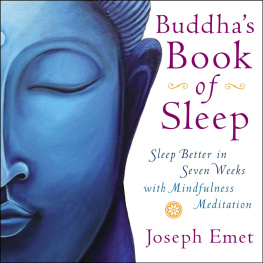MINDFULNESS
and SLEEP
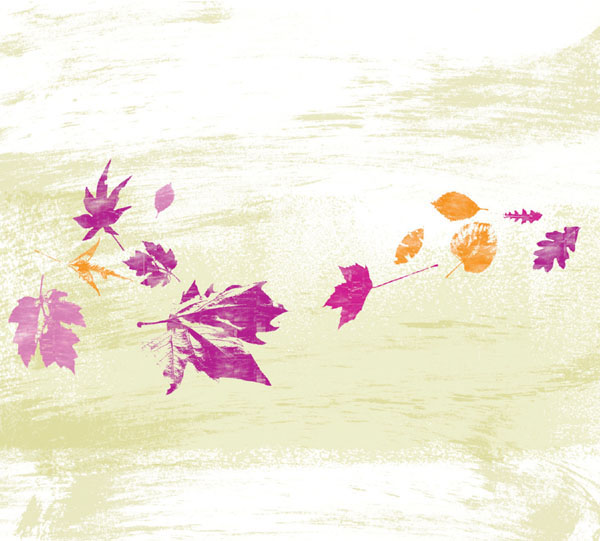
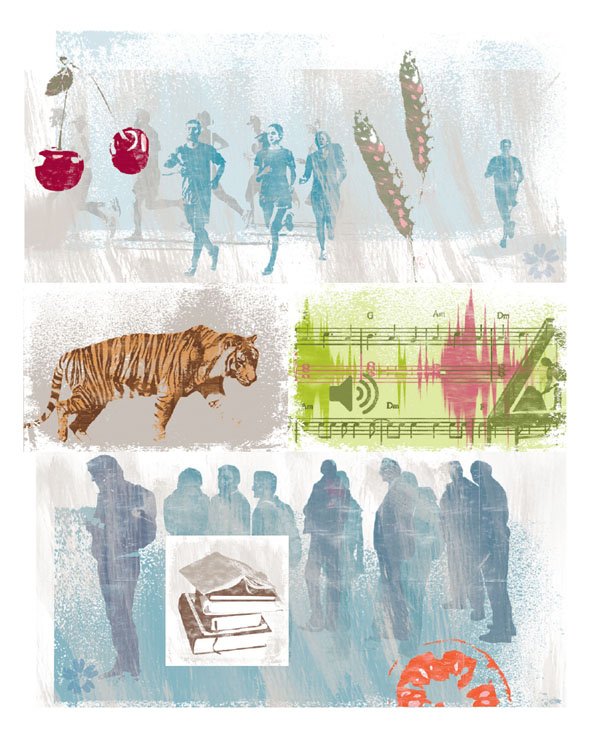
MINDFULNESS
and SLEEP
How to improve your sleep quality
through practicing mindfulness

Anna Black

FOR PIPAWAKE ON THE OTHER SIDE
OF THE WORLD
Published in 2018 by CICO Books
An imprint of Ryland Peters & Small Ltd
2021 Jockeys Fields 341 E 116th St
London WC1R 4BW New York, NY 10029
www.rylandpeters.com
10 9 8 7 6 5 4 3 2 1
Text Anna Black 2018
Design and illustration CICO Books 2018
The authors moral rights have been asserted. All rights reserved. No part of this publication may be reproduced, stored in a retrieval system, or transmitted in any form or by any means, electronic, mechanical, photocopying, or otherwise, without the prior permission of the publisher.
A CIP catalog record for this book is available from the Library of Congress and the British Library.
ISBN: 978-1-78249-560-4
eISBN: 978-1-78249-772-1
Printed in China
Editor: Rosie Fairhead
Designer: Emily Breen
Illustrator: Clare Nicholas
Commissioning editor: Kristine Pidkameny
Senior editor: Carmel Edmonds
Art director: Sally Powell
Production manager: Gordana Simakovic
Publishing manager: Penny Craig
Publisher: Cindy Richards
Please note: If you are having a sustained period of difficulty sleeping, you should always visit your physician for advice.

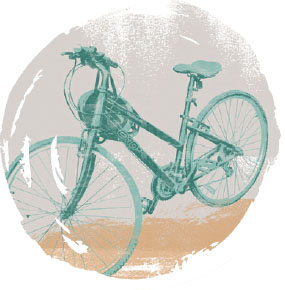

CONTENTS

Most people will at some point experience periods when they find it difficult to sleep. It is most often triggered by a stressful event, but it can also be caused by illness, whether physical or psychological. While some illnesses can cause insomnia, sleep and the physiological functions of the body are so intertwined that many medical conditions can also be exacerbated by, or be a result of, sleep deprivation.

I was always someone who fell asleep within minutes of putting my head on the pillow. If I did wake in the night it was for so brief a time that it didnt affect my sleep quality negatively. I would sympathize with those friends who recounted tales of troubled nights, but I had no real understanding of how debilitating broken nights and sleep deprivation can be. Then everything changed. A combination of hitting my late forties and undertaking stressful building works on my home meant that I joined the millions who have trouble sleeping. And it is millions.
When I first started experiencing problems sleeping, I became interested in what was happening. Sometimes I would struggle to fall asleep as I found myself reviewing the latest building dramas of the day, and it would take an hour or two for me to fall asleep. At other times, I fell asleep quickly but then woke up because I was too hot (the night sweats of the menopause kicking in), and once awake I found myself thinkingand quickly became caught up in a spiral of what if and if only thoughts accompanied by physical feelings of tension in my shoulders and neck, and a sick sensation in the pit of my stomach. As well as thinking about what went on during the day, I would worry about why I wasnt asleep yet, totting up how many hours I already had slept (or not) and trying to guess how it would affect me the next day. I was now very much awake, and it would be a couple of hours before I would fall asleep again, often just before my alarm sounded. The common thread was always thinking. My thoughts would keep me in a state of alertnessmentally and physicallythat was the opposite of the sleep state.

).
What is Yoga Nidra?
Yoga Nidra is a traditional yoga practice designed to induce relaxationphysically, mentally, and emotionally. It has been described as deep relaxation with inner awareness (Swami Satyananda Saraswati, Yoga Nidra, 1976). Yoga Nidra is a systematic practice, usually between 20 and 50 minutes long, that involves first setting an intention or resolve before scanning through different body parts, followed by awareness of breath, feelings, and emotions, and a visualization. In order to relax fully, it is best done following guided instructions. As with the Body Scan on , the intention is not to fall asleep. Many versions are available online, in apps, and as CDs, and I recommend exploring and finding one you like in terms of duration, content, and voice.
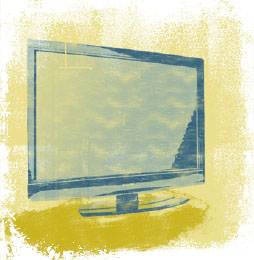
As well as noticing what happened during the night, I also started paying attention to what I was doing in the hours before bedtime. I noticed that those times I had a glass of red wine or two were nights that I really suffered. I noticed that there was an optimum time when I felt sleepy, and if I passed that because I wanted to watch just another episode of the latest box set, it would disrupt my body clock and I would be wide awake for a couple of hours more, even if I didnt want to be. I also noticed that particular activitiesfor example, becoming engrossed in drawingwould make me hyper-alert and energized, and that would affect my ability to fall asleep. These are just some examples of what I noticed about my habits. I stopped drinking red wine and also took steps to help with the menopause symptoms, benefiting my sleep quality. Of course, sometimes I do still stay up past my bedtime, but I appreciate that there will be likely consequences, and so it becomes a conscious choice.
I do still suffer from insomnia from time to time, but Ive got to know it better. I know that its helpful to do certain things and avoid others as a way of increasing my chances of a good nights sleep. If I have trouble falling asleep or if I wake up, I avoid fighting it and instead see it as an opportunity to practice my mindfulness meditations.
I hope this book will awaken a sense of curiosity about your own relationship to sleep, and encourage you to explore another way of being awake and asleep.
Anna Black
This book is not going to fix your sleeping problems, but it will help you understand and manage them. You may have had trouble sleeping for quite a while, or it may be something new for you. Reading this book will not make your insomnia disappear by itself, but you will discover how practicing mindfulness meditation helps to reduce overall stress and changes our perception of difficulties in our life, as well as activating the bodys internal calming response in times of stress. When we feel better able to handle the ups and downs of life, our sleep is more likely to improve.

